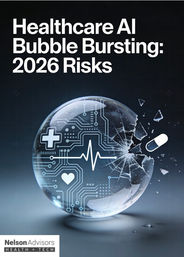Microsoft and consortium of healthcare leaders announces formation of TRAIN: Trustworthy & Responsible AI Network
- Lloyd Price
- Mar 17, 2024
- 3 min read

Exec Summary:
The Trustworthy & Responsible AI Network (TRAIN) is a brand new initiative launched March 2024 focused on ensuring AI is used ethically and effectively within healthcare. It's a collaborative effort between leading healthcare organisations and Microsoft.
Here's a breakdown of what TRAIN is all about:
Mission: Their primary goal is to put responsible AI principles into action to improve the quality, safety, and overall trustworthiness of AI used in healthcare delivery and operations
Activities: TRAIN achieves this through several key activities:
Sharing best practices: Members exchange knowledge and successful strategies for using AI responsibly within healthcare settings.
AI registration: They're developing a secure online portal where healthcare organizations can register AI tools used for clinical care or operations.
Measuring outcomes: TRAIN is creating tools to help healthcare organizations measure the real-world impact of AI on patient care.
National AI registry: They're working towards a federated national AI outcomes registry. This will allow organisations to share anonymised data on how AI is performing in different settings, allowing for continuous improvement.
Benefits: By working together, TRAIN aims to make responsible AI accessible to all healthcare organizations, regardless of size. This will ultimately lead to better patient care and improved healthcare outcomes.
In essence, TRAIN is a collaborative effort to ensure AI is a safe and beneficial tool for the healthcare industry.
Members of the network include AdventHealth, Advocate Health, Boston Children’s Hospital, Cleveland Clinic, Duke Health, Johns Hopkins Medicine, Mass General Brigham, MedStar Health, Mercy, Mount Sinai Health System, Northwestern Medicine, Providence, Sharp HealthCare, University of Texas Southwestern Medical Center, University of Wisconsin School of Medicine and Public Health, Vanderbilt University Medical Center, and Microsoft as the technology enabling partner.
“When it comes to AI’s tremendous capabilities, there is no doubt the technology has the potential to transform healthcare. However, the processes for implementing the technology responsibly are just as vital,” said Dr. David Rhew, global chief medical officer and vice president of healthcare, Microsoft.“By working together, TRAIN members aim to establish best practices for operationalizing responsible AI, helping improve patient outcomes and safety while fostering trust in healthcare AI.”
The Trustworthy & Responsible AI Network (TRAIN) is one of the first health AI networks aimed at operationalizing responsible AI principles. Through collaboration, TRAIN members will help improve the quality, safety, and trustworthiness of AI in health by sharing best practices, enabling registration of AI used for clinical care or clinical operations, providing tools to enable measurement of outcomes associated with the implementation of AI, and facilitating the development of a federated national AI outcomes registry for organizations to share amongst themselves.
Growth and M&A for Healthcare Technology companies
Healthcare Technology Thought Leadership from Nelson Advisors – Market Insights, Analysis & Predictions. Visit https://www.healthcare.digital
HealthTech Corporate Development - Buy Side, Sell Side, Growth & Strategy services for Founders, Owners and Investors. Email lloyd@nelsonadvisors.co.uk
HealthTech M&A Newsletter from Nelson Advisors - HealthTech, Health IT, Digital Health Insights and Analysis. Subscribe Today! https://lnkd.in/e5hTp_xb
HealthTech Corporate Development and M&A - Buy Side, Sell Side, Growth & Strategy services for companies in Europe, Middle East and Africa. Visit www.nelsonadvisors.co.uk

Future for TRAIN
The future of the Trustworthy & Responsible AI Network (TRAIN) is promising, but it will likely depend on a few key factors:
Impact and Growth: TRAIN is a very new initiative (launched March 2024), so its initial success in promoting responsible AI practices in healthcare will be crucial. If they can demonstrate positive outcomes in terms of improved AI quality, safety, and accessibility within the member organisations, we can expect to see TRAIN attract more healthcare organisations and potentially expand its reach beyond the US.
Regulatory Landscape: The legal and regulatory environment surrounding AI is still evolving. As governments around the world grapple with how to regulate AI, TRAIN's work on establishing best practices and measuring outcomes could become even more important. They may play a role in informing or shaping future regulations.
Collaboration with Other Industries: The responsible use of AI isn't unique to healthcare. TRAIN's experience and the tools they develop could be valuable to other industries implementing AI. If they establish successful collaboration, it could broaden their overall impact.
Here are some possible future directions for TRAIN:
Standard-Setting Body: TRAIN could evolve into a leading organisation that sets standards for responsible AI use in healthcare.
Global Network: As mentioned earlier, with success, TRAIN could expand its reach beyond the US and become a global network promoting responsible AI in healthcare across the world.
AI Development & Education: TRAIN might move beyond just best practices and delve into creating resources and educational programs to help healthcare organizations develop and implement responsible AI solutions.
Overall, the Trustworthy & Responsible AI Network has the potential to play a significant role in shaping the responsible development and use of AI in healthcare. Its future success will depend on its ability to demonstrate impact, adapt to the evolving regulatory landscape, and potentially forge collaborations with other sectors.



















































Comments